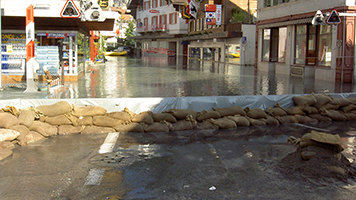The impacts of climate change exacerbate the risks posed by natural events in Switzerland. Due to increased temperatures, the rising snowline and changes in the precipitation regime, the risk of floods, debris flows, landslides and gravitational processes increase. In order to deal with the increased risk, an integrated risk management must continue to be implemented consistently.

According to climate scenarios (CH2018), average temperatures in all regions of Switzerland are expected to rise by three to five degrees by 2100 compared to the average values of 1980-2009. The temperature rise increases the water content in the atmosphere, which generally leads to more turbulent processes. These can have unforeseeable consequences.
In summer, rainfall throughout Switzerland is expected to decline by 20-30%. In winter, however, more precipitation is expected, especially in southern Switzerland. Extreme precipitation must be reckoned with, especially in the winter, but possibly also in the summer. Due to higher temperatures, precipitation will increasingly fall in the form of rain instead of snow.
Impacts and measures
Last modification 01.10.2020








